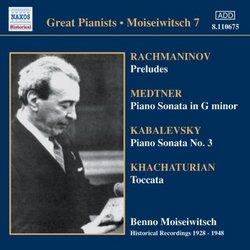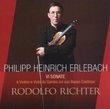| All Artists: Sergey Rachmaninov, Nikolay Medtner, Dmitry Kabalevsky, Sergey Prokofiev, Aram Khachaturian, Benno Moiseiwitsch Title: Moiseiwitsch Plays Rachmaninov, Medtner, Kabalevsky, Khachaturian Members Wishing: 0 Total Copies: 0 Label: Naxos Original Release Date: 1/1/2028 Re-Release Date: 10/21/2003 Genres: Dance & Electronic, Special Interest, Pop, Classical Styles: Vocal Pop, Ballets & Dances, Ballets, Chamber Music, Forms & Genres, Sonatas, Historical Periods, Classical (c.1770-1830), Modern, 20th, & 21st Century Number of Discs: 1 SwapaCD Credits: 1 UPC: 636943167526 |
Search - Sergey Rachmaninov, Nikolay Medtner, Dmitry Kabalevsky :: Moiseiwitsch Plays Rachmaninov, Medtner, Kabalevsky, Khachaturian
 | Sergey Rachmaninov, Nikolay Medtner, Dmitry Kabalevsky Moiseiwitsch Plays Rachmaninov, Medtner, Kabalevsky, Khachaturian Genres: Dance & Electronic, Special Interest, Pop, Classical |
Larger Image |
CD DetailsSimilar CDs
|
CD ReviewsThe Elegant Moiseiwitsch in an All-Russian Program J Scott Morrison | Middlebury VT, USA | 11/12/2003 (5 out of 5 stars) "Benno Moiseiwitsch (1890-1963) was a Russian pianist of the old school, but with a difference. Where others of that group played with brilliance and éclat, his calling cards were a plush tone and an elegantly poetic approach. He never made an ugly sound. Although his playing sometimes lacked the last ounce of forward impetus, it never lacked for sheer tonal beauty. Even warhorses like Rachmaninov's ever-popular 'Prélude in C Sharp Minor,' presented here, is different from others in that it is musing, lyrical rather than heaven-storming. And perhaps the better for it. Six of Rachmaninov's Préludes are included as well as the fourth Moment Musical and Rachmaninov's own transcription of his song, 'Lilacs,' the latter particularly beautifully played here.Moiseiwitsch championed the compositions of his friend, Nikolai Medtner (1880-1951), even though his works were not particularly popular. Of Medtner, Rachmaninov said, in 1921, 'I repeat what I said to you back in Russia: you are, in my opinion, the greatest composer of our time.' Included here are the Sonata in G Minor, Op. 22, the third of his hyper-romantic sonatas, and two of the so-called 'Fairy Tales.' They are played with dramatic sweep that also highlights their formal coherence. Medtner was often called 'the Russian Brahms,' and although his music sounds nothing like the classicist Brahms, it does have more clear formal design than that of some of his compatriots. Modern recordings of the pieces of Medtner by pianists like Hamelin, Demidenko and Tozer have little more to offer besides their more modern sound. One nice touch: there is a lively piano duet of Medtner's 'Round Dance, Op. 58, No. 1' recorded in 1946 with Medtner himself as the second pianist. Rounding out the disc are Kabalevsky's Sonata No. 3, reminiscent of Prokofiev in his mildly sardonic mood, as well as Prokofiev's own 'Suggestion diabolique, Op. 4, No. 4.' Then a bang-up version of Khachaturian's 'Toccata in B Minor.' The final piece, ending the disc in a blaze of glory, is Oscar Levant's piano version of Khachaturian's once-omnipresent 'Sabre Dance.' Yes!As we've come to expect, the transfer from mostly 1940s recordings, done by one of the Naxos Transfer Twins--Ward Marston and Mark Obert-Thorn; in this case, Marston--is simply first-rate. Recommended.TT=79:21Scott Morrison" Thank you, Benno L'vovich! Anton Zimmerling | Moscow, Russia | 11/25/2008 (5 out of 5 stars) "Vol. 7 in the Moiseiwitsch edition of Naxos features this great pianist in the repertoire, where he had few peers - Rachmaninov and Medtner. Both composers were his compatriots and friends. This CD is indispensable for every lover of Rachmaninov's music and for Moiseiwitsch's mavens, since it includes 8 tracks with Rachmaninov's preludes and miniatures with Moiseiwitsch - the largest collection to be found on a single CD. The 9th item - Mendelssohn-Rachmaninov's Scherzo from `A Midsummer Night's Dream' is issued on Naxos Moiseiwitsch series, Vol. 2. On the Arbiter label (Arb 120) - see my review of this CD - Moiseiwitsch recollects a conversation with Rachmaninov: the composer suggested that his friend Benno L'vovich should record a short piece - this scherzo - which he, Rachmaninov, had failed to record successfully, despite many attempts. Later on, Moiseiwitsch recorded this scherzo (17.III.1939) - in an offhand manner, he thought - and it turned to be his best recording, in his own words! I regret that Rachmaninov did not ask Moiseiwitsch explicitly to record other his preludes...
I compared Rachmaninov's own selection of his miniatures with the choice of Moiseiwitsch. Rachmaninov: Op. 3 No.2 in C sharp minor, Op. 23. No.10 in G flat major, Op. 32. No. 3 in E major, Op. 32. No. 7 in F major, Op. 32 No. 12 in G sharp minor, Op. 23 No. 5 in G minor, Op. 32 No. 5 in G major, Moment musicaux Op. 16. No. 2 in E flat minor, Daisies Op. 38. No. 3, Lilacs Op. 21. No 5. Moiseiwitsch: Moment musicaux No. 4 in E minor, Op. 16 No. 4; Preludes in C sharp minor, Op. 3 No.2, in G minor Op. 23 No. 5, in B minor, Op. 32 No. 10 (2 takes), in G major, Op. 32 N. 5, in G sharp minor, Op. 32, No. 12; Lilacs Op. 21 No. 5. One can see that the only one prelude that Rachmaninov *did not* record is the B minor prelude Op. 32. No. 10, which *is* available with Moiseiwitsch. This is not accidental: according to Moiseiwitsch, this gloomy and nostalgic Lento was the favourite prelude of them both, and Rachmaninov liked the interpretation of his friend. Moiseiwitsch even guessed the program of the B minor prelude: this amazing story can be found in different sources, also in the liner notes to this CD. It is great to have two different takes of Moiseiwitsch's approach to this piece (rec. 1940) -- and he plays differently on them! Another miniature not recorded by the composer himself, is Moment musicaux in E minor, Op. 16 No. 4 (rec. 1956). I can hardly imagine a more convincing account of this wild and demonic music. Here Moiseiwitsch's playing definitely does not lack any `forward impetus' Mr. Morrison spoke of in his authoritative review. One caveat: I generally like Ward Marston's transfers on Naxos, but in this case Paul Baily's transfer on Testament SBT 1196 is better. The Testament CD displays Benno's fantastic left-hand-work and dynamic accents at full, while Naxos CD offers a more sloppy and messy sound here. A few words about the rest of the program. Nicolai Medtner was an outstanding composer and a very fine pianist, though not of Rachmaninov's or Moiseiwitsch's caliber. I think that his own recording of his Fairy tale in E minor Op. 34 No. 2 is at least not worse than this version w. Moiseiwitsch. It is nice that Moiseiwitsch decided to help his friend and recorded his Sonata in G minor, Op. 22. It is a large-scale composition, highly romantic, but not eclectic. Moiseiwitsch performs it gloriously, but I would like to listen to another transfer to learn more about Moiseiwitsch's pedaling and dynamics. Dmitry Kabalevsky was a gifted and a very prolific Soviet composer. An infamous joke rooted in Heinrich Neuhaus - Svyatoslav Richter's milieu branded him as a `Shostakovich and Prokofiev for the poor', but I guess that most pianophils happened to enjoy a weaker music than his sonata in F, Op. 46. Finally, Khachaturian's `Sabre Dance' was a Soviet hit. Its piano version was a standard fare for all young virtuosi in my country, but Moiseiwitsch proves that one need not be young or be Soviet in order to play it brilliantly. Highly recommended. A good sound and great performances for a modest prize. Anton Zimmerling Moiseiwitsch Plays Rachmaninov, Medtner, Kabalevsky, KhachaturianBenno MoiseiwitschBenno Moiseiwitsch: Chopin 24 Préludes; Schumann Kinderszenen " |




